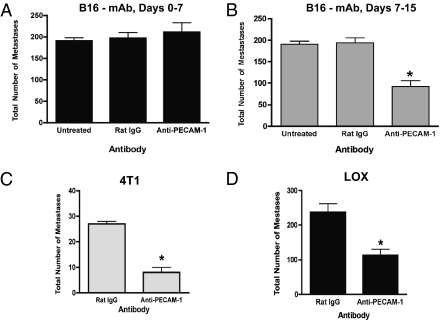Fig. 1.
Anti–PECAM-1 mAb specifically suppresses late-stage but not early-stage metastatic progression. (A and B) Groups of C57BL/6 mice received 25,000 B16-F10 cells i.v. (day 0). (A) In groups receiving early-stage treatment, each mouse received one i.v. injection of 200 μg of anti–PECAM-1 mAb or isotype-control mAb on day 0 and subsequently received one mAb dose every other day through day 7 (five mAb doses). (B) In groups receiving late-stage treatment, each mouse received one i.v. injection of 200 μg anti–PECAM-1 or isotype control mAb on day 7 and subsequently received one dose every other day through day 15 (five mAb doses). All mice were euthanized when multiple control mice became moribund. (C) BALB/c mice received 25,000 4T1 cells i.v. (D) BALB/c nude mice received 1 × 106 LOX cells i.v. Mice received five anti–PECAM-1 or control mAb doses from days 7–15 as above. When multiple control mice became moribund, all mice were euthanized and analyzed. Values represent the mean number of lung metastases ± SEM per mouse (n = 10). Potential statistical significance of differences for A–D was assessed using pairwise two-sided Student's t tests. *P < 0.05.

